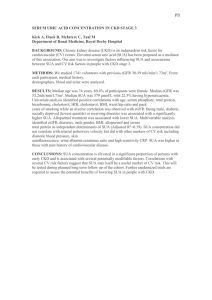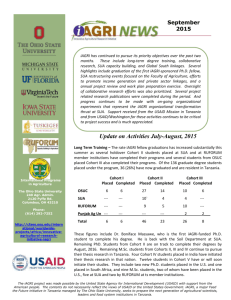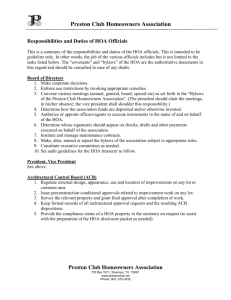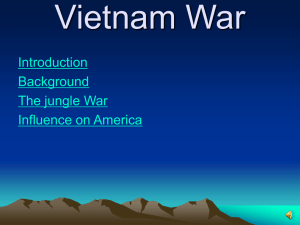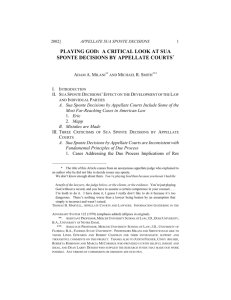Hoa-Sua-at-FIESS-Final-Presentation-CD2
advertisement
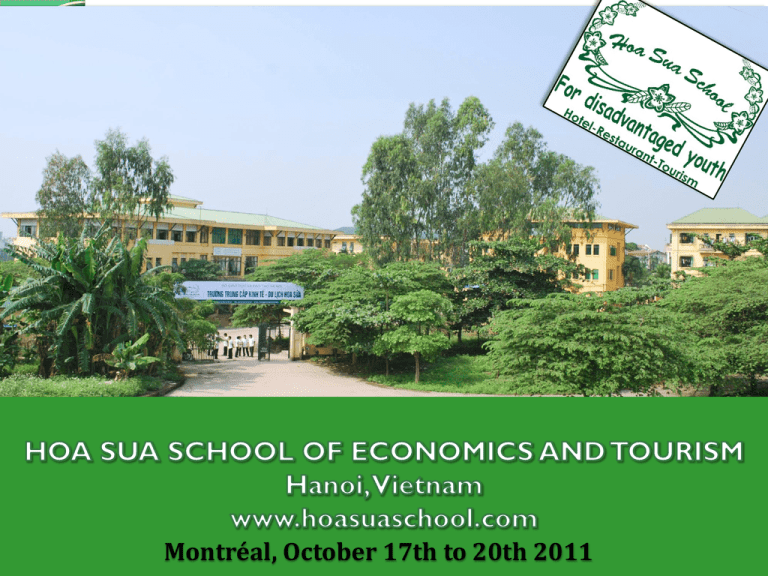
Montréal, October 17th to 20th 2011 Outline Background of Vietnam’s economy. Vietnam’s Labour Market. Key Issues with Vocational Training and Employment. A Vocational School for Disadvantaged Youth. Hoa Sua’s Achievements. Hoa Sua’s Challenges. Vietnam Background One of the best-performing economies in Asia, growing at about 7% per year; Became the 150th WTO member in 2006 and a middleincome country in 2010; Has a young population (64% of all citizens are at working-age); Shift in labour sector (rapid growth in service sectors, particularly tourism). Vietnam The Labour Market More than 1 million people entering the labor market annually; 26% of the labor force is trained (6.5% are trained at vocational colleges); Only 60% of vocational training graduates meet requirements of local enterprises and FDI firms; Vietnam is facing a big shortage of skilled workers. Vocational Training and Employment Key Issues 1. 2. 3. Limited access to education, particularly for the young rural and disadvantaged population; Large gap between the vocational training programs being delivered and the needs of local enterprises; Lack of skills among the labour force. So … What can be done to ensure that graduates from vocational training schools are able to find jobs suitable for what they have been trained to do? What impact do policy and economic issues have? Hoa Sua School for Disadvantaged Youth What is it? A social vocational school supports Vietnam’s poverty reduction strategy by providing high quality training and job placements to young people, especially to disadvantaged youth. The Students at Hoa Sua Abused and trafficked women, natural disaster/ agent orange victims (3%) Hearing impaired and disabled youth (11%) Orphans and street children (26%) Children of war invalids (19%) Children of extremely poor families (31%) Business model used to provide tuition-free education to youth who would otherwise not have access. Benefits for Students at Hoa Sua Uniforms, accommodation, meals and transport B C A Students E D Hoa Sua’s Business Model Hoa Sua’s Strategy Hoa Sua also provides vocational training adapted to labour market needs to further narrow the gap between training and employment. 2 1 Hoa Sua School + Enterprises/ Partner Groups 4 3 Hoa Sua’s Acheivements the largest non-public Vocational Training First and still Institute in Vietnam; first The assessment center for Vietnam Tourism Occupational Skills; Annual intake of 750 students; Approximately 7,000 disadvantaged youth were trained since 1994; 100% graduates find jobs right after graduation; Aim to reintegrate graduates (many from rural and minority areas) into their home regions and economies; Majority of professional teachers are former students. Challenges As a private school, Hoa Sua is not subsidized by the Government, making it hard to recruit qualified teachers High costs of operating training school-run enterprises Slow down in business due to current economic crisis and increasing competition from other schools and enterprises Early stages of a social economy in Vietnam Hoa Sua’s Future Develop new relationships with international organizations to strengthen Hoa Sua school Develop more partnerships with private enterprises in Vietnam to provide training and employment opportunities for students Increase self sufficiency and profitability of Hoa Sua’s training businesses Thank You! www.HoaSuaSchool.com Contact us: hoasuaschool@gmail.com For further information, visit the Uniterra table in Rm 710
